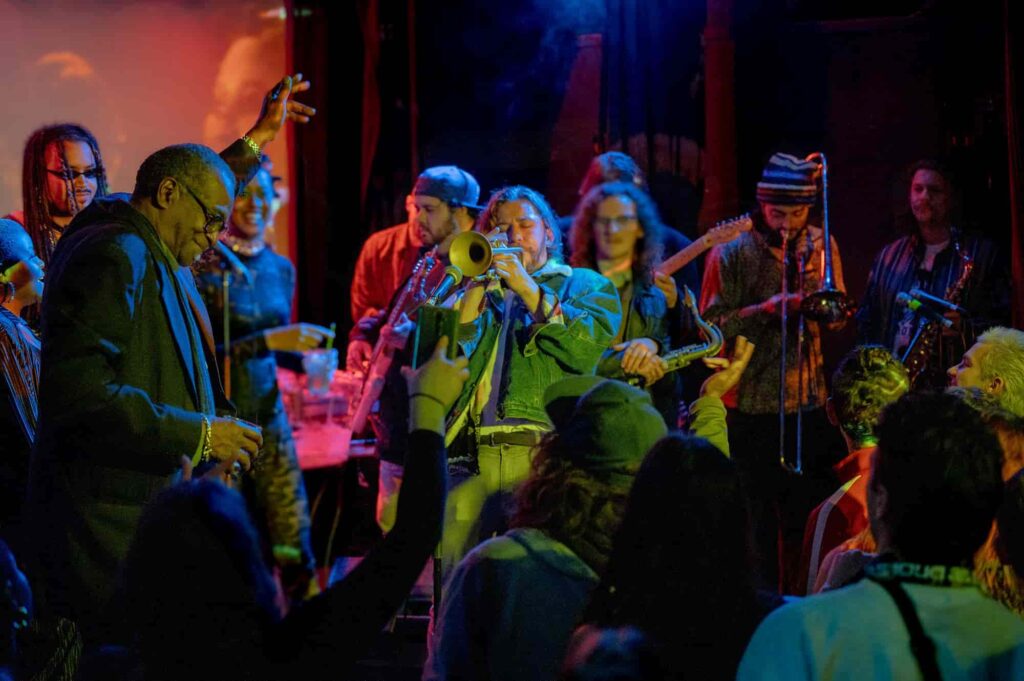“We’ve been playing a few shows here and there,” says Parker, reached on the phone. “Our record label (Thrill Jockey) is celebrating their 20th anniversary and they’ve re-issued a lot of our back catalogue on vinyl. And that inspired us to re-learn some of our old songs. We’ve expanded our performing repertoire by 30 or 40 per cent. So we’ve got a bunch of other songs that we can play now, which is cool.”
The band’s expanded repertoire is especially redeeming considering that it’s been over three years since the release of Beacons Of Ancestorship. Touring without a record to promote can be at once restrictive and liberating. It’s not easy to breathe new life in songs that have been played many times before, though Parker believes the key to touring without a new record is to fight to find a creative energy.
“We’ve been together for a long time and this lineup itself has been together since 1996,” Parker says in earnest. “I honestly believe that it keeps getting better. Sure, we might have been playing the same songs for a long time, but we keep putting creative energy into the songs and they keep evolving. And they keep getting better.”
Parker continues, noting that perhaps the media coverage might be blowing the situation out of proportion. “In a lot of ways, it isn’t any different. The only real difference is in terms of promotion. Because there’s that fresh interest from the media in the story that you’re telling. But then again, I am talking to you,” he says before laughing heartedly.
Tortoise’s decision to tour means has brought the five-piece together for rehearsals and standard preparation, which given each member’s involvement in other projects, is no small task. Drummer John McEntire continues to gig and record with The Sea and Cake, on top of his work as a producer and engineer. Bassist Douglas McCombs released Riot Now! with Eleventh Dream Day, and Parker himself released the jazz-infused Bright Light In Winter as part of the Jeff Parker Trio earlier this year. With each of the members occupying their time post-Beacons Of Ancestorship in many facets, it’s worth asking Parker if it’s difficult to find a common energy once they get back into a room together.
“Sometimes it takes awhile to get the momentum going, especially when we’re working on something new,” he says. “Once we find that groove, things are pretty easy then. We’re able to rely on our 20-plus years as a band to figure out what to do. And usually we can make it work.
“Making it work” sounds easy enough, but as even the most casual of Tortoise fans can attest, their tracks aren’t exactly models of simplicity. Layered thick, their instrumentals tracks evolve from seemingly innocuous beginnings into dense sound-scapes. What sets Tortoise apart is their ability to pull in the reigns of their tracks, before all hell breaks lose. It’s a deft claim that not many modern instrumental acts can make. Parker insists the band takes measures to ensure their tracks maintain cohesion.
“Beacons is one of the more ‘live’ studio albums we’ve ever done,” he says.
“A lot of our compositional techniques would rely on the process we took in the studio. But with Beacons, we felt like that had become a crutch for us, relying on the studio. So we actually assembled the material outside of the studio and then went in, and recorded it live. It’s hard taming that kind of stuff down if it’s what we believe to be the bare essentials, and there’s not a lot of layering. As far as the past stuff, we definitely had to tell ourselves when to stop,” he continues.
“Sometimes the record label would give us a deadline to ensure that we’d actually finish the record up.” While Parker’s mention of label-imposed deadlines isn’t meant as a dig, it’s easy to imagine Tortoise, 20-plus years into their career existing as their own entity.
Jeff Parker can relax, as his band has worked hard to get where they are today. While he doesn’t take a relaxed attitude towards his work, he’s not about to get stressed over the future of the band. In fact, he’s not about to get stressed over much. The music of Tortoise is that of vast, untouched landscapes. And for Parker, to write the music of Tortoise, he’s got to get in the same type of headspace.
“The ideal headspace would be to simply have a blank slate,” he says. “I hate to get all Zen about it, but to have an uncarved block in front of you is good. You don’t want to have anything in the way. A wide open, uncluttered mind is what works best I think.”
BY JOSHUA KLOKE







